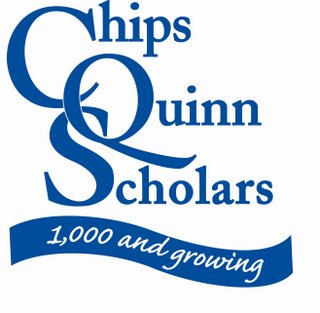He sits in the back of the lecture hall, eyes glued to the speakers. He rarely interrupts, but when he needs to, it's to speak words of fatherly advice to Chipsters. Sometimes his advice is peppered with curse words. Sometimes his advice is peppered with humor. But every time, his advice is saturated with inspiration.
John Quinn is the most intriguing man I've met in a while.
I don't know if it's his dark-rimmed, oversized glasses, his five-foot walking cane (or weapon, for late Chipsters) or his distinct accent, but there's something about this man that makes me want to know more. His words of encouragement, however few or short they may seem, have mentally pushed me to want to be the best intern I can this summer.
(And I know if I'm not, I have a whole family of mama and daddy Chipsters who will hunt me down -- and not to mention, tell father John.)
-- Kim Wallace, University of Kansas, Times Daily, Florence, Ala.


